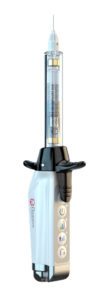 Performing the right injection is the first step toward a pain-free patient experience.
Performing the right injection is the first step toward a pain-free patient experience.
Anesthesia is a first and essential step for most dental procedures. But dentists face a variety of issues when using a traditional syringe, such as:
- Adhering to the recommended injection time (One milliliter in one minute).
- Variations in pressure, which can damage tissue and cause discomfort to the patient.
- Keeping the quality of injections consistent throughout the day.
With the Dentapen, these challenges are greatly reduced.
Dentapen is a new generation of electronic syringe to perform pain free injections. Like most electronic syringes, the Dentapen injection is monitored with a constant flow, at the right pace. This gives dentists the opportunity to focus more on needle insertion1, leading to better control of the injection and a reduction in pain for the patient. For instance, during a study done on 50 dentists who received a palatal injection, 96 percent of them preferred injections from an electronic syringe vs. manual syringe, and their pain perception was reduced by a factor of two2.
What makes the Dentapen different is that it is a self-contained, cordless, intuitive device that matches dentists’ habits. There is no console, no foot pads, and no tubing or proprietary disposables. It can be held in two different ways – by the wings, like a manual syringe, or pen-like, for a precise injection during special procedures. Dentists can use any local anesthetic cartridge and their favorite dental needle. And patients find the small, modern look to be less threatening and more reassuring, helping them to relax.
For over 80 years Septodont has been a global influence in manufacturing dental materials and local anesthetics for the dental community. Today they are a leader in pain management with a presence in over 150 countries with regulatory approvals to match. For more information, visit www.septodont.com.
References:
- Hochman, MN, Chiarello D, Hochman CB, Lopatkin R, Pergola S. Computerized Local Anesthesia Delivery vs. Traditional Syringe Technique. NY State Dent J. 1997; 63:24-9.
Editor’s Note: Sponsored by Septodont.

